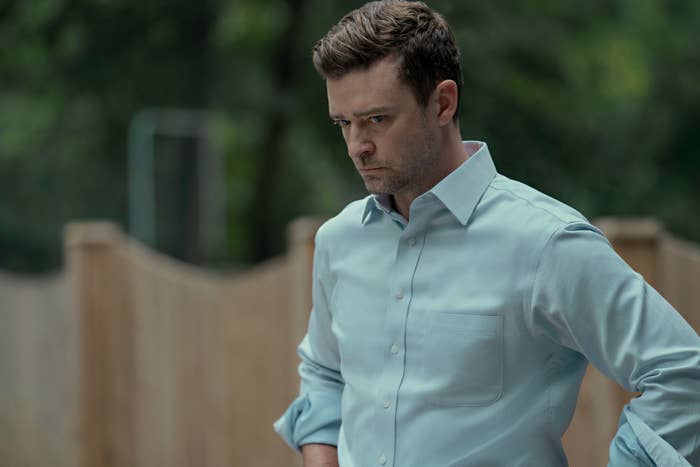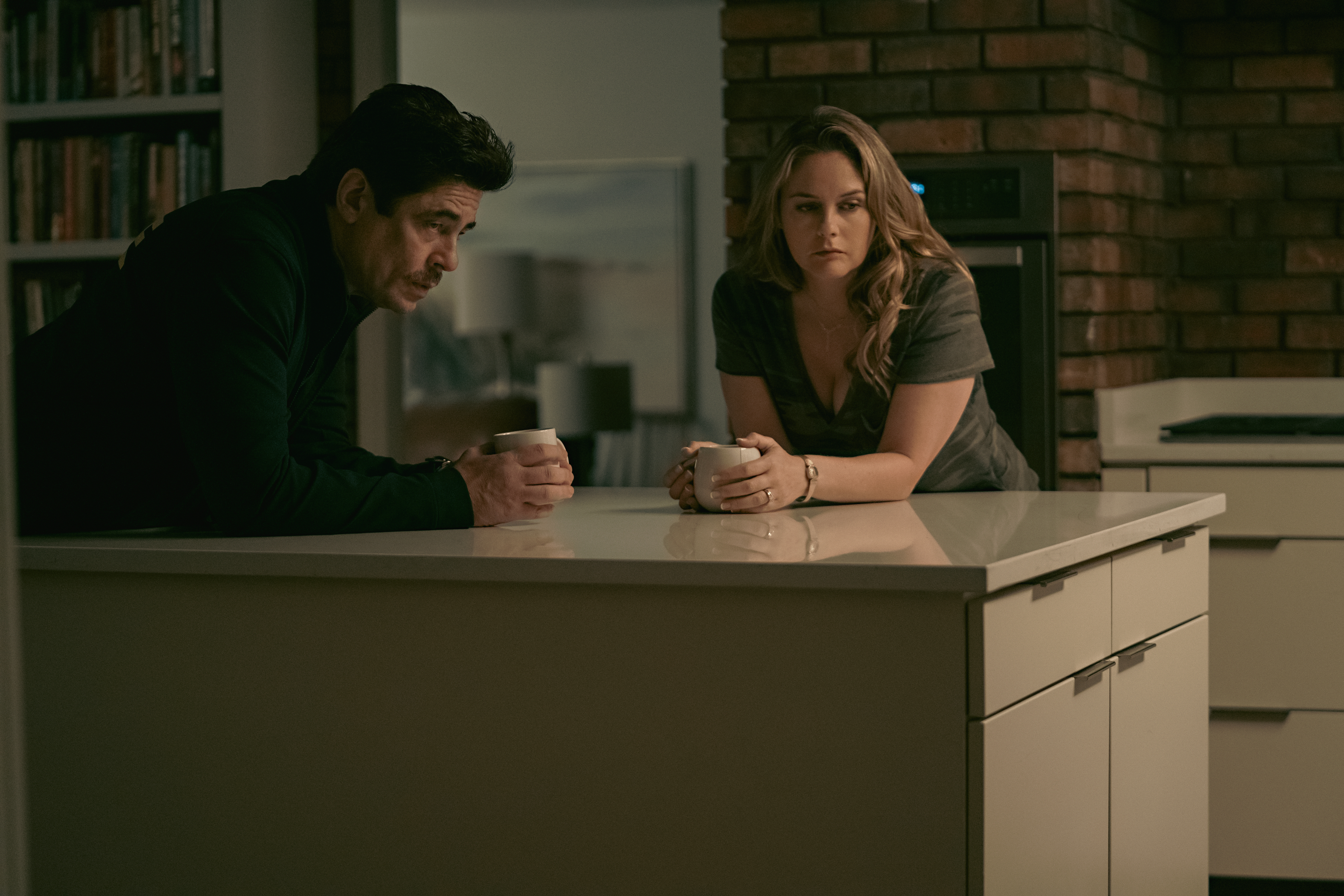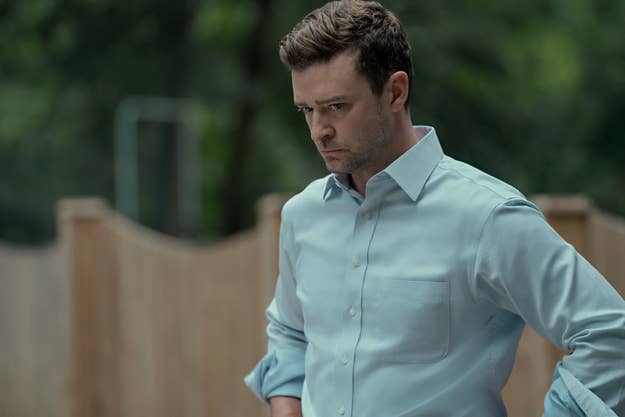
Grant Singer has cemented himself as a familiar name in the music industry, but has now ventured into movies, making his feature film directorial debut with Netflix’s Reptile, which premiered at TIFF a few weeks ago, and streams on Friday.
His work previously included working on music videos for artists like The Weeknd, Sam Smith, Lorde, Taylor Swift, and Ariana Grande. Singer is sure that his background in music videos has played a part in how he curates his vision and style for the film. “I'm sure that you can't make as many music videos that I've made and then not take aspects of that into your movie career.”
The 38-year-old is a movie aficionado—it has always been his dream to make films and he shared that he wants to continue doing that as he challenges himself. He likes the process of making films. “It’s intense,” he laughed.
The film follows a homicide detective Tom Nichols (Benicio Del Toro) who attempts to uncover the truth behind the brutal murder of a young real estate agent, but the more he searches, he realizes nothing is as it seems, and by doing so dismantles the illusions in his own life. It also stars Justin Timberlake and Alicia Silverstone.
Singer also enjoyed collaborating with Timberlake—whom he worked with shortly on a different project shortly before they filmed this one. He revealed that Timberlake is a cinephile so they had shared having many of the same favourite filmmakers and films.
Shortly before the world premiere of his film in TIFF, Complex Canada sat down with Singer to talk about his love of movies, making Reptile, working with Del Toro and more.
Congratulations on the world premiere. Do you remember the moment you found out you got into TIFF?
Yeah! Want to hear something funny? I was in New York when I was screening the movie for one of the actors. I walked out of the theatre and I had to pee so bad and I turned my phone on while I’m in the bathroom, and I got the email that we got in, like as I'm taking a piss and then as I'm walking out, a woman barges in the bathroom. She's like, ‘You should have locked the door.’ I'm like, ‘I just unlocked it’ and so, she was screaming at me that I didn't lock the door even though I did. I had just unlocked it. So that was my first experience (laughs). I got out of the bathroom and had this interaction… but it was amazing. I walked out of the theatre and it just felt like it was a whirlwind of emotions. We make a movie, so much hard work goes into it, it felt really great that the people the programmers in Toronto had responded to it.
I heard you’re a movie aficionado who loves classics like Hitchcock. As someone who loves movies, what is it about the magic of films you loved and wanted to recreate in Reptile?
First of all, that’s a great question. I think I would consider myself a student of film. I love movies, I cherish them and I'm so inspired by them. I'm not saying I’m paying homage, but there are things in certain movies that really inspired me that I felt I was compelled to make something that was almost in dialogue with things that have come before it… it's incredible.
I really liked the mirror shot in the film. It was different and stylistic…
The shot you're talking about, it's very graphic and I think I tend to lean towards things that are graphic, but then if you have too many graphic shots in a row, then it becomes a ‘Look at me, look at me’ thing. So it's trying to balance the invisibility of the filmmaking which I think you really need for a good duration to seduce the viewer and make them feel like they're really within the story and not looking at it from an outside in. It's this very delicate balance, like a dance between being presentational and very classical and formal, but then also feeling like you're within a moment and you're almost in a character's perspective and again playing with POV, which is something i love to do and the emotional tent in the scene and like how within a scene you can change the way you shoot it. Those are things I love considering and really working through when conceiving it.

Having carried this film from the start, what is something you wanted to avoid from the get-go?
I don't think there's anything I wanted to avoid. Honestly, I really don't. I think that I knew that I was very interested in starting with a prologue, where you experience these characters and then you sort of pass the baton to another character and throughout the duration of the movie what you're seeing unfold changes your perspective on those first couple minutes. That was something that I was very interested in doing. And that passing the baton I think you've obviously seen it done so beautifully, in films, like Psycho, for example, it happens a little bit later than ours, but it's just a type of storytelling that I've always been drawn to I think.
Benicio del Toro is not just an actor in this but is also credited as a co-screenwriter. How did that come about?
Ben I had written the script and we set up with our producers who had worked with Benicio on Sicario. And we had him in mind for the role we went out to him and he responded to the project and wanted to meet and once he met and we decided that this was perhaps a project that he would want to pursue, we started working on the script and it was a really beautiful collaboration and the story just evolved. He is incredible at research and I love that aspect of filmmaking too, and he's just incredibly thoughtful and insightful in terms of character and story and he brought a lot of wonderful things to the film and just the project evolved and I think it really benefited from his participation.
You and Justin Timberlake both have a music background. So how did you see Justin as both the musician and then as an actor and to be able to have a shorthand with him?
Well, Justin is a cinephile, which is incredible because we have so many overlaps of favourite movies, and favourite filmmakers. He's such a fine actor, and I thought it was really an inspired casting idea for him to play Will. It's a role I'd never seen him in before. I had worked with him, maybe nine months before we started shooting a little project and that was great and we really hit it off. He responded to the script, he liked my vision for how I was going to direct the movie, we just have a great shorthand with each other. So it was really fun.
There’s something Justin said, “There are so many good directors who have come from commercial and music video work to understand how to tell this story. There's a musicality to filmmaking.” So how has that world sort of influenced your style as a filmmaker?
Great question. I don't know if I can describe my style but I know that one aspect of my style is rhythmic, like I love the editing and the pacing, things that are very rhythmic and at times propulsive and they have maybe even a musical element to the way they’re cut and constructed. And I'm sure that my background in music videos played a part in that even if it was subconscious. I'm sure that you can't make as many music videos that I've made and then not take aspects of that into your movie career. You're gonna be who you are. I think of directing like the way you speak. You might want to sound a certain way but then at the end of the day when you speak you just speak and you can't control the way you sound. You can kind of discern how you're going to say something, but then in the day, you're just going to talk the way you talk. Directing is like that where it just comes natural. You might have inspirations, but then at the end of the day you come to set, it's a blank slate. You work with the actors, you shoot it, and you just have to intuitively direct the scene.
Making your first film is no easy feat. Being a fan of the thriller genre, what did you always want to make sure was incorporated in the film?
I wanted the film to be very mechanical in terms of its construction, where like the action and the storytelling that you're seeing is in dialogue with the lens that is filming it. The camera is almost a character in the movie. It's restrained, but it's really in conversation with the actors that are in a scene and It was very important to me that the film be presented and shot in a way that was very precise. But also elegant, hopefully. It's more of a classical approach. So those are things that I knew I wanted in my first film.
Given this experience, what are the goals you have set for yourself as a director going forward?
I think that I want to continue to make movies and I want to continue to push myself and make movies that I'm inspired by and moved by and really movies that I want to see. Something like Reptile, I felt like this was a movie that I wanted to see. Also, I love the process of making movies. It's such a really intense and amazing journey. I love that process. I think you have to love that process. So I just want to keep challenging myself and being inspired and working with great actors. That's really the ultimate goal.


